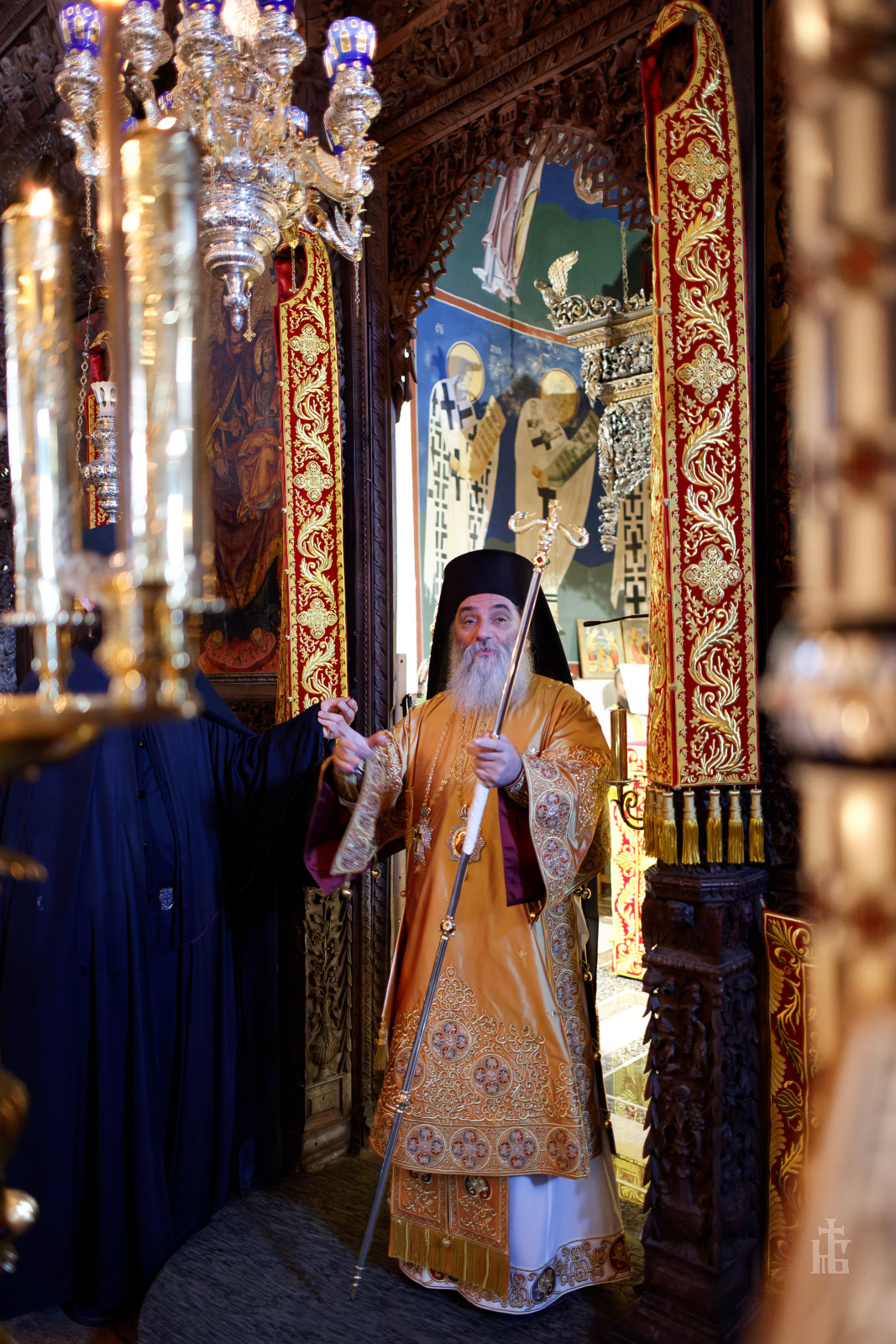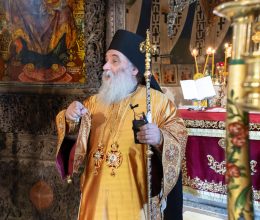Sermon of His Grace, Bishop Partenij of Antania, delivered during the Divine Liturgy in honor of the Holy Chief Apostles Peter and Paul on June 29 / July 12, 2023
In the name of the Father, and of the Son, and of the Holy Spirit!
Let us give thanks to God, my beloved, for granting us once again the blessing to celebrate the solemn commemoration of the Holy, Glorious, All-Praised, Chief Apostles Peter and Paul and to draw lessons from their lives for our own Christian walk.
Last night, during Vespers, one particular verse from the festal hymns deeply touched me. It referred to these two great and foundational pillars of the Church as “rivers of wisdom and the hands of the Cross.” Truly, they are two wondrous and chosen vessels of Christ!
From the Gospel accounts, we know that the Apostle Peter was previously an ordinary fisherman and a simple villager. The Apostle Paul, on the other hand, was a tentmaker by trade, and though well-versed in the Scriptures, he was a fierce persecutor of Christ. See now how profoundly human lives can be transformed when touched by God’s grace! It is no coincidence that our beloved Lord chose two seemingly unworthy individuals as His leading messengers—one, a humble fisherman, and the other, a former persecutor of the Church. Through His miraculous love, He transformed them into His fiery apostles, who preached the truth they had seen in Christ not only with their words but ultimately sealed it with their own blood. According to Church tradition, the Apostle Peter was martyred under Emperor Nero, crucified upside down at his own request, deeming himself unworthy to die in the same manner as his Master, Jesus Christ. The Apostle Paul also met a martyr’s death on the same day, tradition says, as Peter. Since he was a Roman citizen, Paul was beheaded according to the laws governing capital punishment at that time.
Thus, my beloved, we have one apostle who denied the Lord three times and another who persecuted the Church—and yet both became immovable pillars of the Church, ardent preachers of Christ. What was it that made these two men, despite their weaknesses, so strong and immortal in faith? First and foremost, it was God’s love, along with their hearts’ openness to Him. Through His love, the Lord forgave Peter three times for his threefold denial. After His Resurrection, Christ appeared to Peter and asked him three times: “Simon, son of Jonah, do you love Me?” The third time, Peter grieved because Jesus asked him a third time, and he replied: “Lord, You know all things; You know that I love You.” Jesus then said: “Feed My sheep” (John 21:15-17). In this way, the Lord seemed to say: “Do not think too highly of yourself, for you are just like any other person in this world—a man with struggles and weaknesses. Therefore, shepherd My rational sheep, that is, human souls, with love, forgiveness, and understanding. Only through love can you truly be My disciple and preacher.”

As for the Apostle Paul, we recall that he was initially a persecutor of Christians, causing great turmoil in the early Church. Indeed, he was even called Saul, a name that means “troubler” in ancient Greek, reflecting his role in stirring up unrest. Yet the good Lord also caught him with His boundless love, revealing Himself to Paul in a blinding light, so powerful that it left him physically blind. Paul only regained his sight through baptism at the hands of the Apostle Ananias, after which he became a devoted disciple of Christ and the most fervent herald of the Gospel.
We observe, then, these two chief apostles in their former weaknesses—Peter, who denied Christ out of fear for his life, and Paul, who in his delusion persecuted Christ, thinking he was offering service to God. Both, however, fulfilled Christ’s earlier prophecies. Of Peter, Jesus had said: “All of you will be made to stumble because of Me this night. For it is written: ‘I will strike the Shepherd, and the sheep of the flock will be scattered’” (Matthew 26:31). And of Paul, Christ prophesied: “The time is coming that whoever kills you will think that he offers God service” (John 16:2), for Paul persecuted Christians, believing he was glorifying God through his actions.
Beloved, we too, in our everyday lives, often abandon God—whether out of fear of endangering ourselves, fear of losing something, or reluctance to engage in the spiritual struggle required to forsake something we selfishly cling to. Sadly, instead of allowing Christ to live within us and cultivating the new man in Christ, we continue to pity and indulge the old man of Adam, who pulls us toward worldly desires and binds us with countless passions. We prefer to satisfy our selfish desires, giving more honor to our passions than to God, thereby denying Him. For this reason, we desperately need His love and His help. It is only Christ’s love that can cover our weaknesses and sins, just as it did for the apostles whom we honor today.
Let us have these apostles as our prayerful companions on the journey of repentance, as powerful helpers, for they themselves were healed by the love of Christ. God appointed St. Peter as the chief among the Apostles, the arch-shepherd of His Church, teaching him first to forgive, since he himself had experienced weakness and failure. Peter was thus established as an example for future pastors, bishops, and priests, that they too might forgive and love.
As for the Apostle Paul—do we not, at times, act in our lives as Saul once did? In our misguided zeal and self-deception, we too may oppose the Church of God. When we yield to our passions, lacking spiritual enlightenment, we can even persecute God Himself through our actions toward our neighbors, thinking we are doing something good, even offering praise to God. Look around: does this not manifest today in the mutual accusations and judgments among Christians on social media and beyond? Those who call themselves Christians and servants of God argue and quarrel among themselves. Laypeople concern themselves with matters that belong to bishops and clergy. Indeed, throughout history, there have been disagreements regarding church order and canon law, even among bishops and the Apostles themselves. Yet such disputes must never lead to schism, hatred, or estrangement from the love of God.
Let us take today’s celebrated saints, the Holy Apostles Peter and Paul, as an example. From the Acts of the Apostles and various apostolic letters, we learn that these two great Apostles disagreed, even openly clashing over the issue of circumcision. Yet, despite their differences, they never allowed themselves to depart from the love of Christ or to harbor hatred toward one another. On the contrary, they remained true brothers in Christ and became the most steadfast pillars of His Church. This is why, in Orthodox tradition, they are often depicted embracing one another or holding the Church together, signifying that nothing could separate them from the love of Christ.
If we continually judge and condemn one another, we risk becoming false brethren, tearing down the most sacred community of Christ—the Church, which is founded on His very blood poured out from the Cross. As we heard in today’s apostolic reading, St. Paul confessed to the Christians the many dangers he had faced for the sake of the Gospel, including the danger of false brethren: “In perils among false brethren” (2 Corinthians 11:26). Let us not allow ourselves to become false brethren but rather children of Christ’s love. We see how Christ healed both of these Apostles through love. To the one who denied Him three times, He lovingly offered forgiveness three times, and to the other, who persecuted Him, Christ appeared with overwhelming love and made him the Apostle to the nations.
These two Chief Apostles, together with all the Holy Apostles, intercede for us before the throne of God. Let us therefore, especially today as we celebrate their memory, ask them to grant us their apostolic zeal and the same love they had for the Lord Jesus Christ. It is precisely this Divine love that we so desperately need in today’s troubled and sorrowful world, that we may remain steadfast in the struggle for Christ, and, like the great Paul, be able to say: “It is no longer I who live, but Christ lives in me” (Galatians 2:20). This, beloved, is what our merciful Savior desires—for us to become like Him, to become little Christs, to become His hands on the Cross, which means to become rays of His light and love. For it was on the Cross that Christ shone forth His Divine love most brilliantly, and there He ultimately conquered death. This victory from the Cross radiates throughout the world, and His disciples, who accepted Him as the Son of God and the Messiah, became the “hands of the Cross,” as the sacred hymnographer has expressed.
All of us, beloved, must strive to be the hands of the Cross. We must be crucified to the old man and to our passions, so that with our hands—like Christ, who embraced the world—we too may embrace our neighbors and all of creation. In this way, we become guides pointing toward the Kingdom of Heaven, showing the path that Christ has opened for us. The Kingdom of Heaven begins here and now, within us. Let us begin to build it in ourselves, through the prayers of the great and wondrous Chief Apostles Peter and Paul, whose blessing and intercession may we all receive.
Amen!















